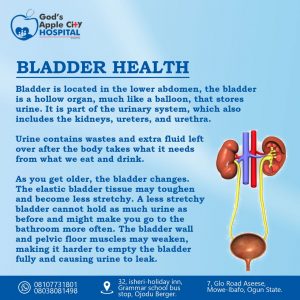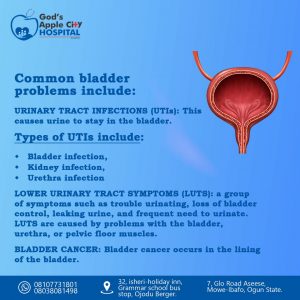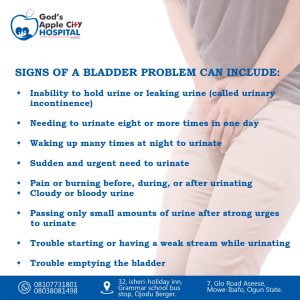Bladder Health
Located in the lower abdomen, the bladder is a hollow organ, much like a balloon, that stores urine. It is part of the urinary system, which also includes the kidneys, ureters, and urethra. Urine contains wastes and extra fluid left over after the body takes what it needs from what we eat and drink.
As you get older, the bladder changes. The elastic bladder tissue may toughen and become less stretchy. A less stretchy bladder cannot hold as much urine as before and might make you go to the bathroom more often. The bladder wall and pelvic floor muscles may weaken, making it harder to empty the bladder fully and causing urine to leak.

Common bladder problems include:
Urinary tract infections (UTIs): UTIs are the second most common type of infection in the body and can happen anywhere in the urinary system. More than half of women will have at least one UTI in their lifetime. Older women are more likely to get UTIs because the bladder muscles weaken and make it hard to fully empty the bladder. This causes urine to stay in the bladder. When urine stays in the bladder too long, it makes an infection more likely.
Types of UTIs include:
Bladder infection: This is the most common type of UTI, in which bacteria enter the bladder and cause symptoms such as strong and sudden urges to urinate.
Kidney infection: Infections in the bladder can spread to the kidneys, which can lead to severe problems. When kidney infections occur frequently or last a long time, they may cause permanent damage to the kidneys.
Urethra infection: A UTI can also develop in the urethra, but this is less common.
Lower urinary tract symptoms (LUTS): A group of symptoms such as trouble urinating, loss of bladder control, leaking urine, and frequent need to urinate. LUTS are caused by problems with the bladder, urethra, or pelvic floor muscles.
Bladder cancer: Bladder cancer occurs in the lining of the bladder.

What Can Affect Bladder Health?
Here are some things that may affect your bladder health.
Constipation: Constipation can cause too much stool to build up in the colon, which can put pressure on the bladder and keep it from expanding the way it should.
Diabetes: Diabetes can damage nerves around the bladder that help with control.
Being overweight: People who are overweight may be at higher risk for leaking urine.
Low physical activity: Physical activity can help prevent bladder problems, as well as constipation. It can also help you keep a healthy weight.
Smoking: Bladder problems are more common among people who smoke. Smoking can also increase the risk for bladder cancer.
Signs of a bladder problem can include:
- Inability to hold urine or leaking urine (called urinary incontinence)
- Needing to urinate eight or more times in one day
- Waking up many times at night to urinate
- Sudden and urgent need to urinate
- Pain or burning before, during, or after urinating
- Cloudy or bloody urine
- Passing only small amounts of urine after strong urges to urinate
- Trouble starting or having a weak stream while urinating

13 tips to keep your bladder healthy
- Drink enough fluids especially water: Most healthy people should try to drink six to eight, 8-ounce glasses of fluid each day. Water is the best fluid for bladder health. At least half of fluid intake should be water. Some people need to drink less water because of certain conditions, such as kidney failure or heart disease. Ask your healthcare provider how much fluid is healthy for you.
- Limit alcohol and caffeine: Cutting down on alcohol and caffeinated foods and drinks—such as coffee, tea, chocolate, and most sodas—may help.
- Quit smoking: If you smoke, take steps to quit . If you don’t smoke, don’t start.
- Avoid constipation: Eating plenty of high fiber foods (like whole grains, vegetables, and fruits), drinking enough water, and being physically active can help prevent constipation.
- Keep a healthy weight: Making healthy food choices and being physically active can help you keep a healthy weight.
- Exercise regularly: Physical activity can help prevent bladder problems, as well as constipation. It can also help you keep a healthy weight.
- Do pelvic floor muscle exercises: Pelvic floor exercises, also known as Kegel exercises, help hold urine in the bladder. Daily exercises can strengthen these muscles, which can help keep urine from leaking when you sneeze, cough, lift, laugh, or have a sudden urge to urinate.
- Use the bathroom often and when needed: Try to urinate at least every 3 to 4 hours. Holding urine in your bladder for too long can weaken your bladder muscles and make a bladder infection more likely.
- Take enough time to fully empty the bladder when urinating: Rushing when you urinate may not allow you to fully empty the bladder. If urine stays in the bladder too long, it can make a bladder infection more likely.
- Be in a relaxed position while urinating: Relaxing the muscles around the bladder will make it easier to empty the bladder. For women, hovering over the toilet seat may make it hard to relax, so it is best to sit on the toilet seat.
- Wipe from front to back after using the toilet: Women should wipe from front to back to keep bacteria from getting into the urethra. This step is most important after a bowel movement.
- Urinate after sex: Both women and men should urinate shortly after sex to flush away bacteria that may have entered the urethra during sex.
- Wear cotton underwear and loose-fitting clothes: Wearing loose, cotton clothing will allow air to keep the area around the urethra dry. Tight-fitting jeans and nylon underwear can trap moisture and help bacteria grow.
follow us on facebook to read more:
https://web.facebook.com/Godsapplecity
read other blogs https://godsapplecityhospital.com/breast-cancer-signs-and-detection/

